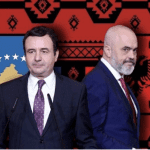By Nicola Nixon
During the 1990s, all the European post-communist countries made a great display of rejecting ‘communism’. This took different forms in different countries but there are certain similarities across the board. For example, in most former communist countries, notions of women’s equality were rejected in favour of a return to ‘traditional’ family values; the upshot of which has been a massive reduction of women’s involvement in the public sphere, particularly in politics, and Albania is no exception. Gender equality was therefore dumped. Notions of collectivity such as cooperative organisations or even sometimes simply ‘cooperation’, were similarly jettisoned, as tarnished with the brush of Marxist-Leninism.
Yet in all cases, this was largely window-dressing. Many of the underlying social habits that had been formed during and due to communist authoritarianism, in particular countries, slipped through the net and are still making their presence felt in contemporary societies. In Albania, one of these is the significance of family background as the basis for reputation in public life. Rather than notions of individual merit, family reputation can clearly be seen as a dominant force in public political life, all the way to the top. And it is this which provides the context in which to understand Sali Berisha’s rather shocking attack on Edi Rama at last week’s opening of the DP local election campaign.
During the communist period in Albania, ‘biografi’ – one’s family’s reputation – was everything. The Party, through the secret services, maintained a grip on people’s actions and words through collective punishment of one’s family. And this didn’t have to mean one’s immediate family. The actions of one member could resonate out to one’s cousins, aunts, uncles and other distant relatives. It was one of the more sinister ways in which totalitarian power was maintained. For example, if someone escaped Albania or committed a ‘crime against the state’ such as criticising the state openly, their entire family would be punished through numerous means. Among these, beyond imprisonment, were forced relocation of whole families to isolated regions, the reduction in employment or study prospects, and the reduction and careful monitoring of family movements. I have heard numerous stories that start with such statements as; “I couldn’t go to university because my cousin was imprisoned”, “My movements were monitored by the sigurimi because my uncle got out to Greece” etc. In other words, individual worth was judged on the basis of one’s family background. While those at the bottom end of the rung were therefore constantly concerned with what their family members were doing, those at the top were constantly monitoring and judging their actions on that basis.
This concept is ever-present in Albania today and constitutes, to my mind, one of the most dramatic ways in which Albanian society is still living, in a sense, in the communist period. Family reputation remains one of the strongest points of judgement of a person rather than an assessment on the basis of his/her actions. It is very common to hear the pronouncement of one person in the public eye on another, starting with, “Well, his father wasŢ, “Her family has an excellent reputation etc.” This deeply ingrained societal tendency accounts in part, of course, for the high degree of nepotism in such things as employment in Albania.
If family reputation – as a collective entity – is everything, then of course scandal within any family taints all members of the family in the public eye. Given that the denigration of one’s family background is likely therefore to have an effect on public opinion in Albania, it is not so surprising to read that the brunt of Berisha’s attack on Rama had little to do with Rama’s performance in public life, but more to do with scandalising his familial reputation. “When Edvin was young,” stated Berisha to a packed audience of DP supporters and the media, “he ruined the wedding of his brother. Broke everything and destroy the ceremony. He was telling him why did you take my wife.” Relevance? An internal family scandal that denigrates Rama’s reputation more effectively than anything he could say about his political actions. Berisha went on to mention Rama’s divorces and insinuate that Rama carries on ‘orgies’ with public money. One can hardly be the member of a ‘normal’ family if, as Berisha proposed, “he is neither a man nor a woman”. But the key statement, that evidences this ongoing obsession with family reputation was when the Prime Minister suggested that Rama “doesn’t have a family because he doesn’t believe in it.”
To the outside observer, the first impression of these and the numerous other strange things that emanated from Berisha that night is that they simply represent a lack of political maturity. But what I am suggesting is that these comments represent something considerably more sinister: the ongoing use of authoritarian forms of political power, that have their roots in the communist system, in contemporary Albanian political life. And until such time as there is a serious assessment of the forms of social and political power that operated during that system, and a rejection of those rather than the superficial rejection of ‘Communism’, they are likely to continue to dominate Albanian political life and hinder its development.
The importance of family reputation in Albanian political life

Change font size:









